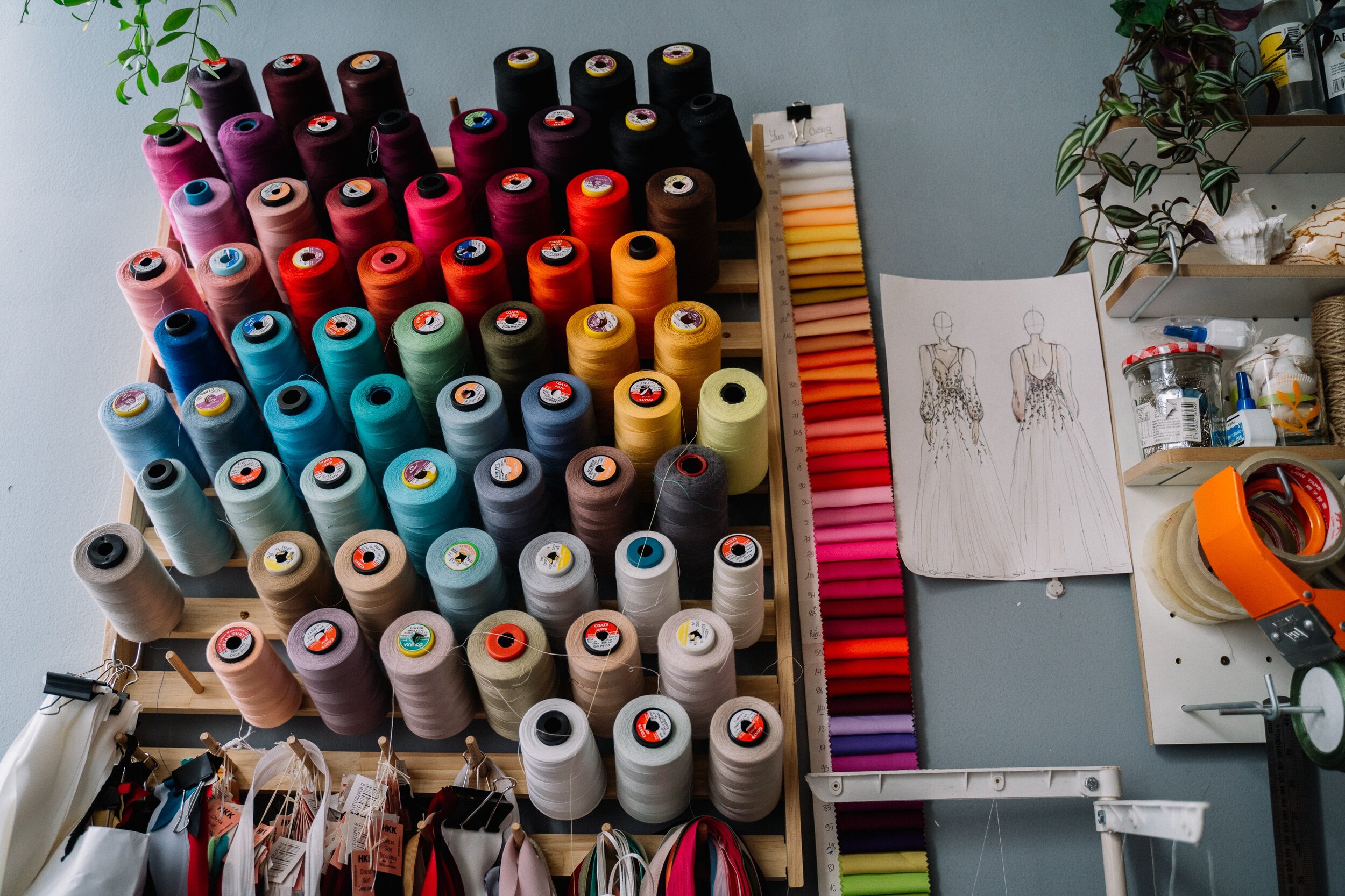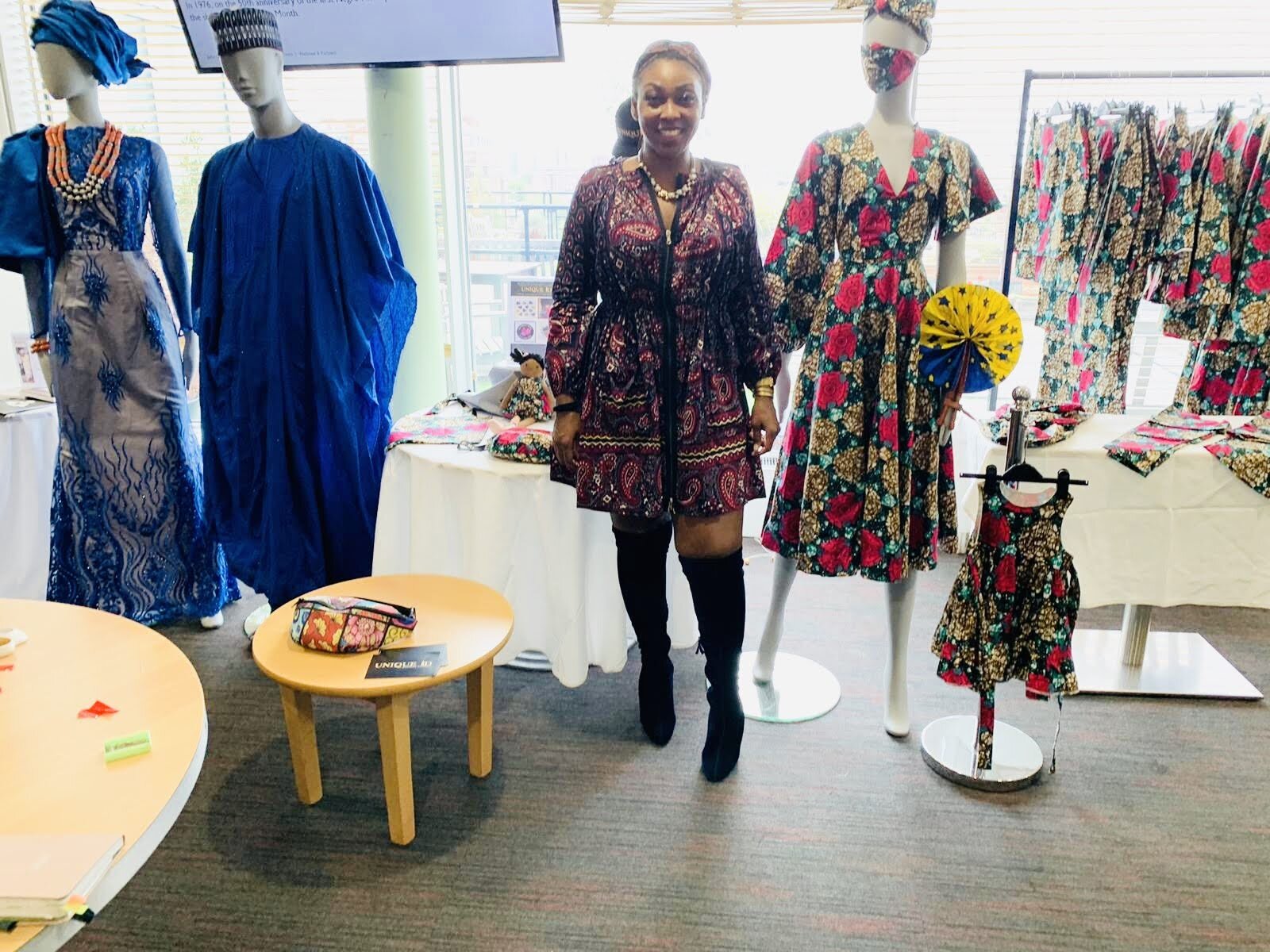
Building a Fashion Business while Building a Family.
A founder learns how to balance her career passions with being a mum.
By Emma Golley
Interview with Vicky Quadri
With so many fashion professionals leaving the corporate world to start their own businesses, we wanted to learn more about their personal journeys, and some of the pros & cons of life as a fashion entrepreneur.
Vicky Quadri has been a designer in the fashion industry for over 15 years, working for both big names on the high street and luxury brands. She is now the founder and CEO of Unique ID Bespoke Fashion, which launched during the pandemic last year. Vicky started out with a soft launch of bespoke face masks, whilst also working behind the scenes to create her apparel line and build awareness through her social media channels.
During her extensive career in fashion, she took notice as the industry began shifting its standard sizing to fit an increasingly diverse range of body shapes and sizes. She felt passionate about transforming some of the still outdated industry standards, and hoped to create a unique concept which could appeal to many types of customers. She wondered, with so many different body shapes in the world, what if a person could not only find the perfect fit, but could also get to choose their own fabric to make the perfect garment?
Whilst on maternity leave with her first child, Vicky set out to make this idea a reality. Her plan was to build an an online dress experience, made to accommodate customers who are too busy or too far away to visit a tailor/seamstress. In just a few simple steps, customers can design the dress of their dreams directly on her website.
And since Vicky strongly supports “Zero Waste” principals as well as all of the mothers shopping with her, buyers are even given the option to create ‘mini me’ outfits from any leftover fabrics (at a discounted price of course!)
We caught up with her to find out more about her journey in the fashion industry and what it takes to launch your own business on top of being a first-time mum.
Vicky, throughout the pandemic you have managed to juggle launching your own business with motherhood, how have you found a balance that works for you?
To be honest I haven’t yet, I’ve just kept going and whatever issues I have to deal with along the way I solve as I go.
The pandemic was obviously never part of the plan and could have never been predicted. When it came along I had to rejig my focus a little and not only concentrate on the apparel line for my business but try and think of other opportunities to be creative during the pandemic.
One of the ways I achieved this was by applying to work for a fund which concentrates on the employment of black people with chronic health conditions. My project was to teach members how to sew and create handmade products to sell via their own marketplace, and to build their confidence through that. This project has kept me very busy as I’ve had to manage everything by myself, as well as teaching members the fundamentals of sewing on a new platform. Teaching virtually really pushed me out of my comfort zone as it was all new for me but I’m so glad I did it.
Vicky and her daughter
Regarding motherhood, my little one is 2 years old so she’s currently at home with me all day. Keeping her entertained has been the hardest of all. I don’t get much done in the day, but I’ve always been a night-owl so when I put her down to sleep, I continue to do my fashion admin till the early hours in the morning. (Which I wouldn’t advise to do long term as I end up burning out!) Luckily my husband does the morning shift before he logs on for work whilst I catch up with my sleep and take over so it works perfectly.
“The brand I had dedicated 10 years of my life to made me redundant at the most vulnerable time of my life, just before going on my maternity leave”
Tell us about your career prior to starting your own business:
Previous to starting my own business I spent most of my professional career working for a well-known high street fashion brand. I grew in confidence and experience within all of my roles there and was lucky to have a boss who supported me along my journey. I started as a swatch book coordinator and progressed to an Accessories designer. I sourced all of the fabrics and trims and designed & presented my collections twice a year to a panel of buyers who would scrutinize and drop half of my designs within seconds of viewing it. This aspect of the job I always found hard but I soon developed a thick skin. I used to think my designs were not good enough but quickly realised that it was the buyers job to stick to a buying pattern of previous sales that they would use to compare to new designs. This would help them predict forth-coming sales for the season, so it all came down to prediction really.
I also assisted with the collection development of the apparel line, so my experience has been enhanced as I got to work on apparel and accessories from two different points of view.
Vicky presenting to John Lewis and Partners for her forthcoming apparel line. She was asked to present her business venture as part of Black History month.
What spurred you on to build your own brand?
I’ve always wanted to have my own fashion label. Alongside working professionally in my career, I created bespoke dresses for clients in my own time for their special occasions. I had always said to myself that I would work on my business plan during my maternity leave and that’s exactly what I did.
It also became evident that launching my own brand was the right route for me, as I didn’t want to commit myself to working full time for another retailer anymore. Especially after my experience working with the brand I had dedicated 10 years of my life to made me redundant at the most vulnerable time of my life, just before going on my maternity leave. There was no loyalty whatsoever. Brands will use you and get rid of you whenever they feel like it. So I became freelance to concentrate on the bigger picture, as well as be a mum.
What are some unexpected challenges of running your own business?
The first year is often the hardest year as your plans and predictions may not go the way you’d originally planned. Especially last year - you can’t exactly predict a pandemic when you launch your business, which in turn will have a huge effect on your money goals.
Another thing I learned is that if I become ill, I have no one to fall back on or continue to run my business which is very scary. During the pandemic, I was ill for about a month due to the flu and exhaustion from my sewing project, so I found myself bed-bound. I couldn’t ask anyone to help me with my admin, drawings or deadlines I had set out for myself so that opened my eyes a bit. I’m now starting to consider looking for freelance assistance so I can get additional help during the setting up stages of my launch.
“You should continue to do your best, put your best foot forward and always think of the end result.”
What have you found are some of the pros and cons to going it alone in the fashion industry?
I’m still in the early stages where I’m not sure there are too many pros for going it alone to be honest. As I mentioned, I’ve had so much pressure to do everything by myself and if I wear myself out or become ill, then I’m out of action for a few weeks and have to play catch up with myself which is tough. I also don’t have anyone to bounce my design ideas with. I’m often going back and forth in my head, scrutinising my own work - whereas I could do with a fresh pair of eyes to say ‘Ok Vicky this works and this doesn’t work’ and move on quickly with other things I need to do.
Another aspect of the cons are that I often don’t give myself enough credit that I have done enough for my business. I’m one person trying to juggle motherhood, wife duties and setting up a whole business single handedly which is a lot of work. Sometimes I feel really guilty if I haven’t picked up a pencil to draw in a few days but on the other hand, if all I have done is work on my collection all week then I feel guilty if i haven’t taken my daughter for a walk. So, I’m constantly battling with myself. I think one of the pro’s is how I get to be my own creative boss, making my own decisions when designing. I also have the freedom to carry out my own market research to figure out what my customers need, and am able to react to that accordingly.
Tell us the biggest lesson you've learnt so far throughout this experience:
The biggest lesson I have learnt is that although I’ve tried to plan and schedule my whole life down on a calendar, I shouldn’t beat myself up if things don’t happen how I’ve planned. You have to just pick yourself right back up from where you left off and keep moving. You should continue to do your best, put your best foot forward and always think of the end result.
What advice do you have for other female founders considering starting their own brand?
If you have a vision, Believe, Achieve and Succeed and everything will fall into place. Work on your dream every day until your vision becomes reality. And most importantly, especially if/when you're thinking of starting a family, think about what role model you want your child to look up to and aspire to be. Become the best version for your future and especially theirs.
Visit Vicky’s website
You can share Vicky’s story on socials via the links below!
One of Vicky’s faux collar designs
Vicky sells a huge variety of bespoke face masks on her website
Like this article? Sign up to our new newsletter to get more articles like this delivered straight to your inbox once a month.
Related Articles.
Real Talk: Life In The Fashion Industry And The Challenges Of Being An African American Designer.
An honest conversation with Designer Ryun Harrison.
Stories | By Emma Golley | 09.16.20
From Humble Beginnings to High Street Winning.
Accessories Designer Emily Westaway tells us her story from humble beginnings in rural Cornwall, to designing for some of the biggest brands on the high street.
Stories | By Emma Golley | 09.16.20
Why I Walked Away From My Career In Fashion.
The story of a highly talented individual with incredible potential, who was turned off the industry entirely due to the actions of a single colleague.
Stories | By Anonymous | 05.12.20









